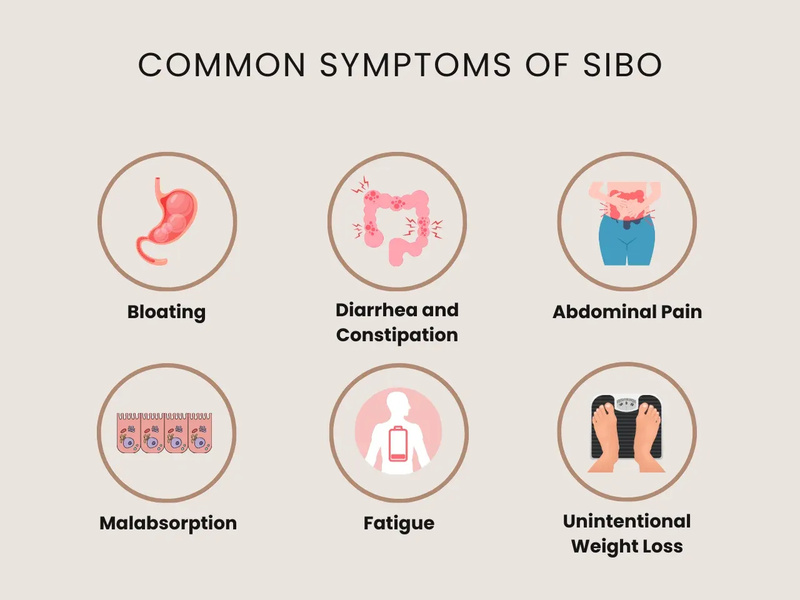Understanding SIBO and Its Impact on Gut Health
Small Intestinal Bacterial Overgrowth, also known as SIBO, is a situation where too many bacteria grow in the small intestine. This can cause problems with digestion and make people feel uncomfortable. Those who have this condition may have bloating sensations, discomforting feelings, and difficulties absorbing necessary nutrients which affect their gut health negatively. Knowing about SIBO is very important because if diagnosed early and treated properly it helps manage the signs better and brings back balance to your digestive system. This guide offers insights into six main aspects of SIBO, aiding you in comprehending and controlling this situation better.
What Causes SIBO?
When bacteria, which are commonly located in the large intestine, start to grow in number within the small intestine, it leads to a condition known as SIBO. The larger part of our intestines can manage with increased bacterial presence. However, this doesn't hold od true for its smaller counterpart. A rise in bacteria here could be due to many reasons, maybe because acid content has fallen in the stomach or there's slow movement inside the gut area or even unforeseen design issues present within the digestion process system. Low stomach acid, which is frequently triggered by medicines, can lead to SIBO as it enables bacteria growth. Likewise, slower movement in the gut stops the regular removal of bacteria from the small intestine and creates a place for bacterial overgrowth. By understanding these root causes, people along with healthcare professionals will be able to find successful SIBO treatment methods that tackle the particular cause causing bacterial imbalance.
- Medication Effect: Some medications, especially acid blockers, can lower stomach acid and increase SIBO risk.
- Surgical History: Past surgeries, especially on the digestive tract, may increase susceptibility to SIBO.
Common Symptoms of SIBO

Symptoms of SIBO often look similar to other problems in the gut, which makes finding out what it is difficult. Usual signs are feeling bloated, having gas, pain in the stomach area, loose stools, or hard-to-pass stools. Persons with SIBO might also have weight loss or lack some nutrients because their bodies cannot take these from food properly. In the small intestine, bacteria can cause digestion problems by meddling with enzymes and harming the lining of the intestine which is crucial for taking in nutrients. Exhaustion and confusion are further signs that might occur due to shortfalls in these nutrients, particularly if there's a lack of vitamins like B12 in the body. Spotting these symptoms and going for necessary testing could assist people in pinpointing SIBO at an early stage which then enables more specific treatment as well as handling of symptoms.
- Symptom Overlap: SIBO symptoms can be similar to IBS, often leading to misdiagnosis.
- Fatigue Factor: Chronic fatigue is common due to nutrient deficiencies caused by SIBO.
How SIBO Affects Gut Health
SIBO strongly affects the total health of the gut due to its disturbance to the balance of bacteria in the digestion system. When there is too much bacteria growth in the small intestine, it results in inflammation that harms the intestinal lining. This harm may enhance the permeability of the intestines which we commonly call "leaky gut". It then permits particles from undigested food and toxins into the bloodstream. Also, SIBO can hinder the body's capacity to take in necessary nutrients, which affects intestinal health and general good condition more. Dealing with symptoms of SIBO at an early stage may avoid other problems because if not treated, it could result in long-term inflammation and ongoing issues related to gut health as well as intricate digestive disturbances.
- Nutrient Loss: Malabsorption of essential vitamins and minerals is a common consequence of SIBO.
- Inflammation Risk: Persistent inflammation from SIBO can lead to long-term digestive issues if untreated.
Diagnosing SIBO - What Tests Are Available?
The right way to identify SIBO usually includes breath testing. This checks the existence of hydrogen and methane gases that bacteria in the small intestine create. The most frequently applied test is the lactulose breath test, during which people consume a solution made from lactulose. Breath samples are collected for various hours to spot gas production. When levels of hydrogen or methane rise, it indicates excessive bacterial growth inside the small intestine. Other ways to diagnose can be using stool tests, blood tests, or even endoscopy, based on the opinion of your health provider. To find out if it is SIBO with a trustworthy test assists in making sure treatment reduces excess bacteria growth, helping symptoms and boosting gut well-being.
- Breath Test Sensitivity: The lactulose breath test may require multiple samples for accuracy.
- Additional Testing: Some cases may need imaging tests if other structural issues are suspected.
SIBO Treatment Options
Treatment for SIBO usually includes a mix of antibiotics, changes in diet, and probiotics to bring back the good balance of bacteria within the small intestine. Antibiotics like rifaximin are often recommended to decrease bacterial growth but are frequently combined with alterations in food intake to avoid it coming back again. A diet low in FODMAP that lowers fermentable carbohydrates might assist in reducing symptoms of SIBO by restricting sources of nutrition for bacteria. Furthermore, probiotics can help to restore good bacteria and boost gut health. Each person's treatment plan must be customized because factors like the severity of symptoms and root causes of SIBO will determine the strategy used. It is very important to consult a healthcare professional to find out which treatment method works best.
- Diet Influence: High-FODMAP foods may exacerbate symptoms if not managed carefully.
- Probiotic Use: Probiotics may be beneficial but should be used under professional guidance.
Preventing SIBO Recurrence

To avoid SIBO from happening again, you need to alter your way of life and diet to keep your stomach healthy and decrease the chance of bacteria growing too much. Ways to do this are by helping gut movement with regular exercise and dealing with any other problems that could cause an imbalance in bacteria. People who have had SIBO generally find it beneficial when they add many foods full of fiber which helps their digestive system, but also stay away from foods that might set off symptoms. Also, probiotics and prebiotics might help to keep your gut microbes balanced. But you must talk with a health expert to make sure they are using the right way to stop SIBO from coming back. Taking good care of your gut health over time and regular check-ups can be useful for people to maintain their digestive system balance and lessen the chance of having SIBO again in the future.
- Hydration Role: Staying well-hydrated can support regular bowel movements and gut health.
- Stress Impact: Chronic stress can affect gut motility and may increase SIBO risk.
Conclusion
To handle SIBO, it is crucial to know what causes it, identify its signs, and obtain proper diagnosis with matched treatment. People need to use a steady plan that incorporates medicines, changes in diet, and active life decisions. This way they can manage SIBO effectively while promoting long-term gut health. Stopping the condition from coming back is also very important because continuously taking care of one's digestive system will help keep our stomach healthy and avoid problems in the future. Individuals diagnosed with SIBO can enhance their well-being and digestive comfort by actively collaborating with healthcare professionals and following a custom treatment plan.












